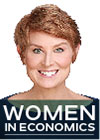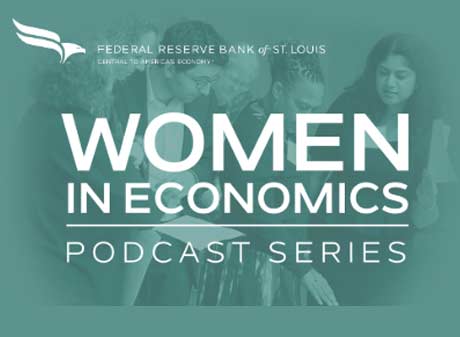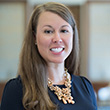"How I Got into Economics": Prominent Women Share Their Stories
Is economics a male-dominated field?
St. Louis Fed President Jim Bullard recently wrote about how women are underrepresented in economics, beginning at the undergraduate level. The gap then widens, he said, carrying forward to advanced careers in econ. Among the studies Bullard cited was a paper by Amanda Bayer and Cecilia Elena Rouse, which found that women earned about 31% of doctorates in economics in 2014.These numbers are based on data for U.S. citizens and permanent residents. See Bayer, Amanda; and Rouse, Cecilia Elena. “Diversity in the Economics Profession: A New Attack on an Old Problem.” Journal of Economic Perspectives, Fall 2016, Vol. 30, No. 4, pp. 221-42.
“Considering the economics profession’s influence on public policy, attracting more diverse candidates is paramount,” Bullard wrote. “Yet, with the limited pipeline of diverse talent discussed above, creating real change means playing the long game.”
This is why the St. Louis Fed launched a Women in Economics initiative in 2018. It includes a symposium that attracts undergraduate students from across the nation, as well as a podcast series featuring women who’ve risen to prominence in economics. Their academic and career journeys span decades and, often, the globe.
All of our guests’ stories begin in different places. Here are a few for inspiration.
Excited by an evening macroeconomics class
Barbara Flowers recently retired from the St. Louis Fed after serving on our Economic Education team. Her path to economics was not a traditional one: She was a 28-year-old mom when she took her first econ course at a community college.
“I was babysitting other peoples’ kids. And I knew that was not going to be the path for me. I wanted more, but I had never really enjoyed school,” she said. “… Life gets very serious, obviously, when you have children. And I was thinking about my ability to get them so far along in their future.”
She decided to enroll in a macroeconomics night class. “I came out of that class thinking, ‘This is it. This explains everything. I will never do anything but economics.’” She went on to graduate from the University of Missouri-St. Louis. There, she became director of the Center for Entrepreneurship and Economic Education before joining the Fed.
“I would encourage women, I’d encourage anyone to get into the field of economics. And not necessarily to become a Ph.D. and go teach in a university,” she said. “Economics is a good field of study for learning about how to manage your life.”
Episode 17: Barb Flowers (full transcript)
An epic conversation on Mount Kilimanjaro
Lisa Cook is an associate professor of economics and international relations at Michigan State University. Her pursuit of an economics career was sparked by a climb on Kilimanjaro, where she had a transformative talk with a fellow hiker.
“I went to the University of Dakar after I finished Oxford to figure out whether I wanted to do a Ph.D. in philosophy. And I needed to actually go to Africa and live in Africa, find out whether there were philosophers who would be able to advise me if I got into a good program.”
While in Senegal, she started asking questions about economics and exchange rates: “This economy was so out of whack. The incentives were misaligned. Everything was happening. And then it led me to ask questions about how countries develop and whether there really is convergence between countries. Do developing countries ever catch up?”
To help clear her head, she visited Mt. Kilimanjaro. There she met a hiker who happened to be a Cambridge-trained economist. “Basically, for the five hours it took to climb to the first hut, he was convincing me that what I needed to do was a Ph.D. in economics. If I had this training in physics and this training in philosophy, and the questions that I had, and want to put them together in a certain way, then economics was probably what I wanted to do.”
Episode 14: Lisa Cook (full transcript)
An epiphany about human behavior

Diane Swonk is chief economist and managing director at the accounting firm Grant Thornton. She said that economics “kind of chose” her and described how dyslexia became a strength in her career.
“I'm severely dyslexic, and I grew up in the Detroit area during the worst of its economic demise in the 1970s and 1980s. And, the first economics class I took, I took only by accident. It was the only class open when I actually went to go register for classes, and I read the synopsis. I thought, ‘This sounds kind of interesting.’”
Although it turned out to be a 350-person lecture class, weekly breakout sessions with the teaching assistant helped to crystallize the value of the material—along with her unique value: “I flip numbers, but I can do calculus in my head, and I grew up in the middle of something that was an economic train wreck. And, all of a sudden, the economics I was learning explained it could have been avoided, and the reality that I could make a difference in this world and people's lives, that this was really about human behavior, policy, and interpreting how to make it better for the world, I was hooked that first class.”
Today, Swonk does work with the Yale Center for Dyslexia & Creativity and the Rush NeuroBehavioral Center. She noted that IQ and reading ability are not related, and she said that thinking differently is an asset: “I think that's really a useful way of framing the world … realizing that any change one place can have a reaction function somewhere else.”
Episode 8: Diane Swonk (full transcript)
Continue the Journey
Discover more interviews and insights from the St. Louis Fed’s Women in Economics podcast. Recent episodes include:
- Kathleen Hays, global economics and policy editor for Bloomberg.
- Amanda Bayer, co-author of the aforementioned study and a visiting senior adviser at the Federal Reserve Board of Governors.
- Lael Brainard, a member of the Fed Board of Governors.
Notes and References
1 These numbers are based on data for U.S. citizens and permanent residents. See Bayer, Amanda; and Rouse, Cecilia Elena. “Diversity in the Economics Profession: A New Attack on an Old Problem.” Journal of Economic Perspectives, Fall 2016, Vol. 30, No. 4, pp. 221-42.
This blog explains everyday economics and the Fed, while also spotlighting St. Louis Fed people and programs. Views expressed are not necessarily those of the St. Louis Fed or Federal Reserve System.
Email Us



